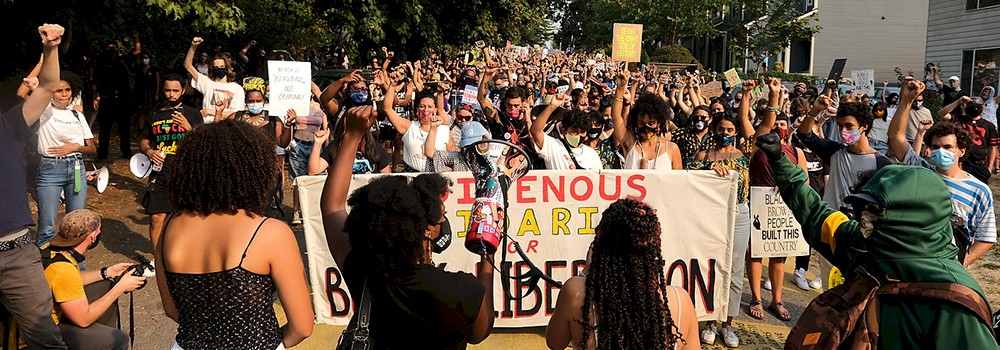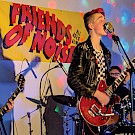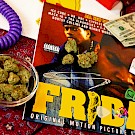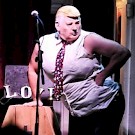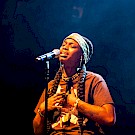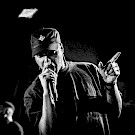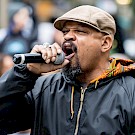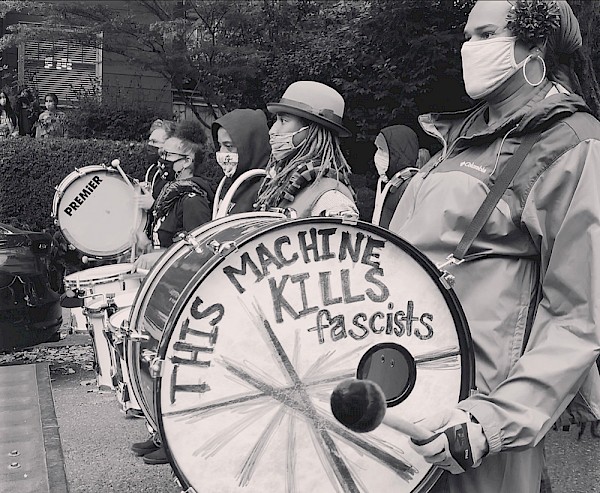 The Frontline Drumline are the heartbeat of the revolution, reminding us that Black joy, in itself, has always been a form of active resistance. The BIPOC-led collective of anti-fascist drummers provide rhythm and focus to the Portland-area marches, rallies and protests that have dominated the media in 2020. Pictured from right to left: Bandleaders Mal, Ray, Scot, Dominique: Photo by Faith Faucet
The Frontline Drumline are the heartbeat of the revolution, reminding us that Black joy, in itself, has always been a form of active resistance. The BIPOC-led collective of anti-fascist drummers provide rhythm and focus to the Portland-area marches, rallies and protests that have dominated the media in 2020. Pictured from right to left: Bandleaders Mal, Ray, Scot, Dominique: Photo by Faith Faucet I’ve found myself starting a lot of my notes and letters and emails with this statement. It’s as if I say it enough it will become a reality.
I’ve found myself starting a lot of my notes and letters and emails with this statement. It’s as if I say it enough it will become a reality.
 In recent years, sounds have become a central part of my life. I helped start and now run a small nonprofit called Friends of Noise. We seek to foster healing and growth for the youth in our community via the arts by hosting professional development workshops, inclusive, all-ages concerts that provide live performance opportunities for youth artists, and hands-on experience for emerging youth sound engineers. We also find youth paid gigs.
In recent years, sounds have become a central part of my life. I helped start and now run a small nonprofit called Friends of Noise. We seek to foster healing and growth for the youth in our community via the arts by hosting professional development workshops, inclusive, all-ages concerts that provide live performance opportunities for youth artists, and hands-on experience for emerging youth sound engineers. We also find youth paid gigs.
Prior to the pandemic, my weekends were filled with the sounds of the joyful music of emerging youth artists like Wavy Josef, Out of Luck, Mei Anna and others at their first paid gigs, or the start-and-stop staccato rhythm of a sound check. I had grown accustomed to hearing the sigh of relief after a successful show, the shuffling feet that didn’t want to leave and have the night end, and the teens saying thanks for an opportunity to play music that was so dear to them.
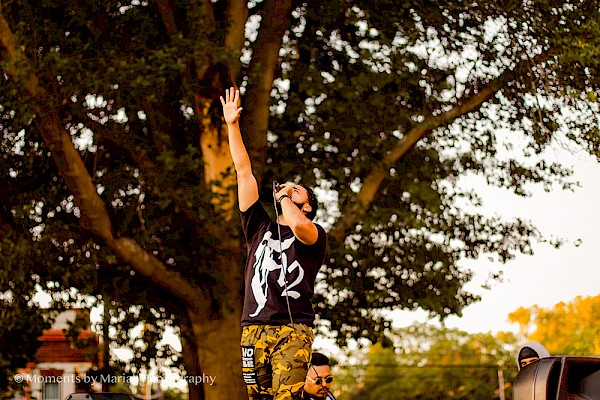 Rapper and artist Jahdi’s world changed when he became an activist this summer in the movement to liberate Black lives: Photo by Moments by Mariah PhotographyIn the early stages of the pandemic, silence and the worry about when I could return to the life that I had built were ever-present. Fear, doubt and not knowing if my organization and career would survive the economic slowdown became a daily ritual to overcome. I knew I had to do something, but I was at a loss as to what course of action would set me on a path back to the life and music scene that I had come to cherish.
Rapper and artist Jahdi’s world changed when he became an activist this summer in the movement to liberate Black lives: Photo by Moments by Mariah PhotographyIn the early stages of the pandemic, silence and the worry about when I could return to the life that I had built were ever-present. Fear, doubt and not knowing if my organization and career would survive the economic slowdown became a daily ritual to overcome. I knew I had to do something, but I was at a loss as to what course of action would set me on a path back to the life and music scene that I had come to cherish.
In early May, I learned of the murder of Ahmaud Arbery, a young Black man who was chased by white vigilantes and shot while he was jogging in a predominately white neighborhood in Georgia. Later that month, another story broke about a white woman in Central Park who called the police, in a threatening manner, on a gay Black man who was birding.
As these stories were making the rounds on social media, other stories about Black people being killed by police started filling up my timeline with regular frequency. It was not hard to get swept up in the internet outrage, and truth be told, I wasn’t fighting it. All the dots were lining up so I followed the developing stories and grew more and more stressed and anxious.
Soon after Memorial Day, I learned of the murder of George Floyd by officers of the Minneapolis Police Department. How could they do this knowing that the world was watching?
To this day, I have been unable to watch the video of his murder. It was a horrible story that shocked the nation, and the world, and caused people to take to the streets in numbers that I had not seen since the protests against the first Gulf War in the 1990s.
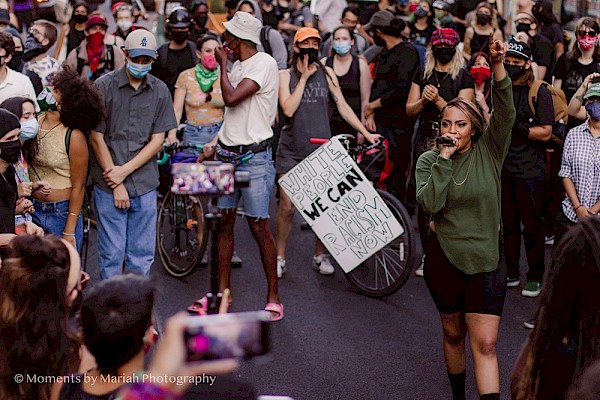 Karma Rivera owned the Pearl District street in front of Mayor Ted Wheeler’s condo on August 28; a week later, he moved out: Photo by Moments by Mariah PhotographyAfter George Floyd was murdered, something changed. Maybe it was the pandemic? Perhaps it was a swelling sense of grief and outrage at how Black lives have been so disposable and devalued for the entirety of this country’s existence? The rapid-fire succession of Black people killed in May of 2020 had a definite impact on opening my eyes to the miscarriage and unequal justice here in America.
Karma Rivera owned the Pearl District street in front of Mayor Ted Wheeler’s condo on August 28; a week later, he moved out: Photo by Moments by Mariah PhotographyAfter George Floyd was murdered, something changed. Maybe it was the pandemic? Perhaps it was a swelling sense of grief and outrage at how Black lives have been so disposable and devalued for the entirety of this country’s existence? The rapid-fire succession of Black people killed in May of 2020 had a definite impact on opening my eyes to the miscarriage and unequal justice here in America.
 The growing grief I felt for the increasing list of Black folks killed by law enforcement was getting hard to manage. The feeling of helpless futility and dread that there would be a new name added to that list, perhaps my own, was becoming a heavy weight to bear. Unable to attend shows, I found some solace by diving into my CD collection and sought out the conscious hip-hop of my youth. Public Enemy, Poor Righteous Teachers and Native Tongues were in constant rotation, reminding me of a time when the sound of mental liberation and Black joy was considered mainstream enough to be on the radio and MTV. I miss the days when seeing a Black medallion and a head nod was all I needed to know that I was among my people.
The growing grief I felt for the increasing list of Black folks killed by law enforcement was getting hard to manage. The feeling of helpless futility and dread that there would be a new name added to that list, perhaps my own, was becoming a heavy weight to bear. Unable to attend shows, I found some solace by diving into my CD collection and sought out the conscious hip-hop of my youth. Public Enemy, Poor Righteous Teachers and Native Tongues were in constant rotation, reminding me of a time when the sound of mental liberation and Black joy was considered mainstream enough to be on the radio and MTV. I miss the days when seeing a Black medallion and a head nod was all I needed to know that I was among my people.
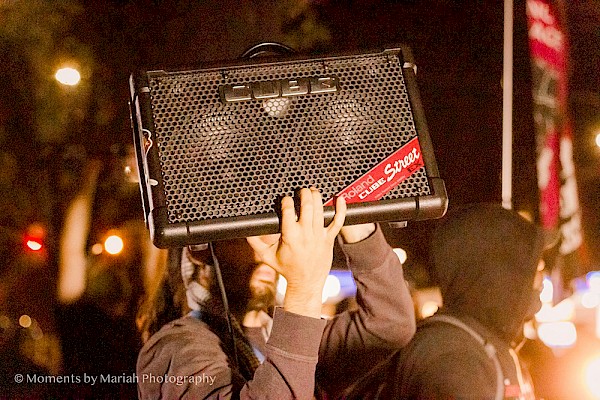 Throughout the protests, individuals often decided to bring their own speakers in a tradition known as SoundBloc: Photo by Moments by Mariah PhotographyI found myself in a pretty dark place in early June and I reached out to a friend to chat about my sadness, anger and frustration. I’ve known this friend for close to two decades and I’ve seen his own struggles with debilitating depression. I’m a pretty upbeat person so this sustained malaise was new to me. We talked for hours, and at some point, I confessed a desire to break things and lash out at a society that didn’t think that my life mattered—a society that created a so-called criminal justice system that often gives grace to the wealthy, white and connected.
Throughout the protests, individuals often decided to bring their own speakers in a tradition known as SoundBloc: Photo by Moments by Mariah PhotographyI found myself in a pretty dark place in early June and I reached out to a friend to chat about my sadness, anger and frustration. I’ve known this friend for close to two decades and I’ve seen his own struggles with debilitating depression. I’m a pretty upbeat person so this sustained malaise was new to me. We talked for hours, and at some point, I confessed a desire to break things and lash out at a society that didn’t think that my life mattered—a society that created a so-called criminal justice system that often gives grace to the wealthy, white and connected.
 Like many others, on May 29, I attended the rally for George Floyd at Peninsula Park in North Portland. The energy from the thousands of people who had assembled there to express their sadness, rage and calls for sustainable change was palpable. I still get chills thinking about all those people joining their voices in reminding me that my life does matter, because it always did.
Like many others, on May 29, I attended the rally for George Floyd at Peninsula Park in North Portland. The energy from the thousands of people who had assembled there to express their sadness, rage and calls for sustainable change was palpable. I still get chills thinking about all those people joining their voices in reminding me that my life does matter, because it always did.
Sadly, however, it was close to impossible to hear the voices of the speakers. As luck would have it, my nonprofit has a storage area filled with sound gear so a great friend and ally of Friends of Noise and I came up with the idea of building a mobile PA system.
While the mobile PA was being constructed, on June 10, I was offered an opportunity to speak at a rally in Grant Park. As fate would have it, I was already writing a speech to post on YouTube so I was actually on my second draft of something. I tried to channel all the speeches I had heard in the past. I thought about cadence, rhythm, call and response. It was at this rally that I got to see so many musicians, poets and other activists who had answered the call to share their talent and inspire crowds numbering in the thousands to be better and shout out that “Black Lives Matter!”
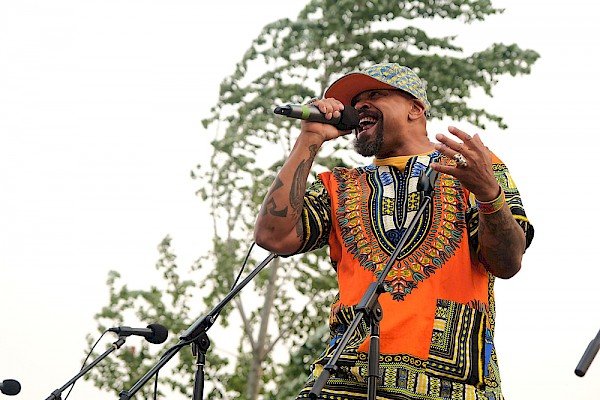 Longtime activist and emcee Mic Crenshaw rocked the mic at Cathedral Park on Labor Day: Photo by Tojo AndrianarivoThis is what a healthy and inclusive community sounds like: Emcees like Jahdi, Mic Crenshaw and Marzz kept the crowds bopping while poets like Brianna Grisby, Kinsey Smyth and Aaron Spriggs used words to paint what a just world could look like.
Longtime activist and emcee Mic Crenshaw rocked the mic at Cathedral Park on Labor Day: Photo by Tojo AndrianarivoThis is what a healthy and inclusive community sounds like: Emcees like Jahdi, Mic Crenshaw and Marzz kept the crowds bopping while poets like Brianna Grisby, Kinsey Smyth and Aaron Spriggs used words to paint what a just world could look like.
Once the mobile unit was complete, I let the activist community know that my gear and I would be available, free of charge, to amplify their voices so that their messages could be heard. I focused my energies mostly on youth and family actions, and I ended up at large and small rallies in all four quadrants of Portland, and even some of the suburbs too.
From small rallies in Lents to over 2,000 people at Cathedral Park, I’ve been fortunate to hear so many sounds of this movement. The Frontline Drumline provided the rhythm, Black youth provided the fire, and the crowds responded to the calls of “Black Lives” with a resounding “Matter!”
 I heard a 10-year-old poet named Aidan Carter share his poem “Hello Black Child.” I heard strength overcome fear in the voices of many speakers who shared how they had been impacted by the systems that prop up white supremacy. I heard the mournful wail of over 50 stringed instruments playing in unison at the violin vigil for Elijah McClain at Peninsula Park.
I heard a 10-year-old poet named Aidan Carter share his poem “Hello Black Child.” I heard strength overcome fear in the voices of many speakers who shared how they had been impacted by the systems that prop up white supremacy. I heard the mournful wail of over 50 stringed instruments playing in unison at the violin vigil for Elijah McClain at Peninsula Park.
By my count, I have provided sound support at some 20 actions and counting, and what I heard at all of them was a resolve to identify our power and direct it at the systems and structures that depend on white supremacy to survive. It was an honor to join other sound providers like local DJ Ronin Roc and Sound Bloc to support the movement.
When I decided to dedicate my summer to amplifying the voices of those demanding the destruction of systems that support white supremacy, my only goal was to make a contribution to the cause. I had to do something, for if this was the civil rights movement of my era, I couldn’t sit on the sidelines. I had to bring my lived experience to bear.
In hindsight, loading up my car and answering the calls from organizers was actually an act of self-salvation. I was able to fill the silence that haunted me in the early spring with the sounds of a movement for justice and accountability. I got to witness a wide range of organizers and thousands of community members protesting an unjust society that has treated Black lives as disposable and not worthy of grace or compassion. I was able to participate and collaborate with youth and elders, Black and white, gay and straight, trans and cis, native and immigrants, and people I had no clue I’d meet in building systems of mutual aid.
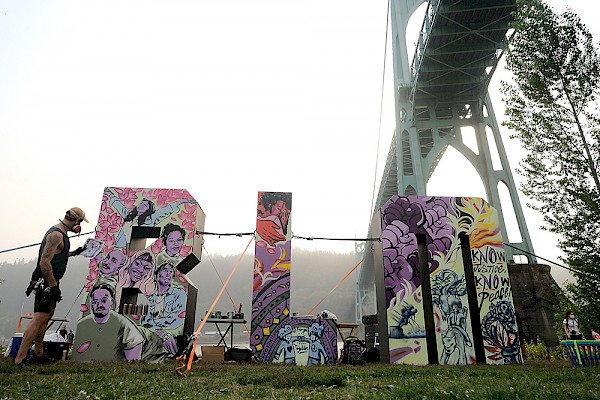 A Black Lives Matter art installation beneath the St. Johns Bridge in Cathedral Park at the Labor Day rally: Photo by Tojo AndrianarivoNow, I truly know what Martin Luther King Jr. meant when he said that he had seen the promised land. I’ve seen it too. The promised land isn’t in the future. It’s in the present, a present that we make together. It’s in the faces of the people we work with and support to keep the movement sustainable. It’s in the labor that we share in remaking the world not as it is, but as it should be.
A Black Lives Matter art installation beneath the St. Johns Bridge in Cathedral Park at the Labor Day rally: Photo by Tojo AndrianarivoNow, I truly know what Martin Luther King Jr. meant when he said that he had seen the promised land. I’ve seen it too. The promised land isn’t in the future. It’s in the present, a present that we make together. It’s in the faces of the people we work with and support to keep the movement sustainable. It’s in the labor that we share in remaking the world not as it is, but as it should be.
We can do this because we already are.
Stay together, stay tight!
Black Lives Matter!
André Middleton is a founder and the executive director of Friends of Noise, a nonprofit that supports youth musicians and a safer, more inclusive all-ages music scene.

